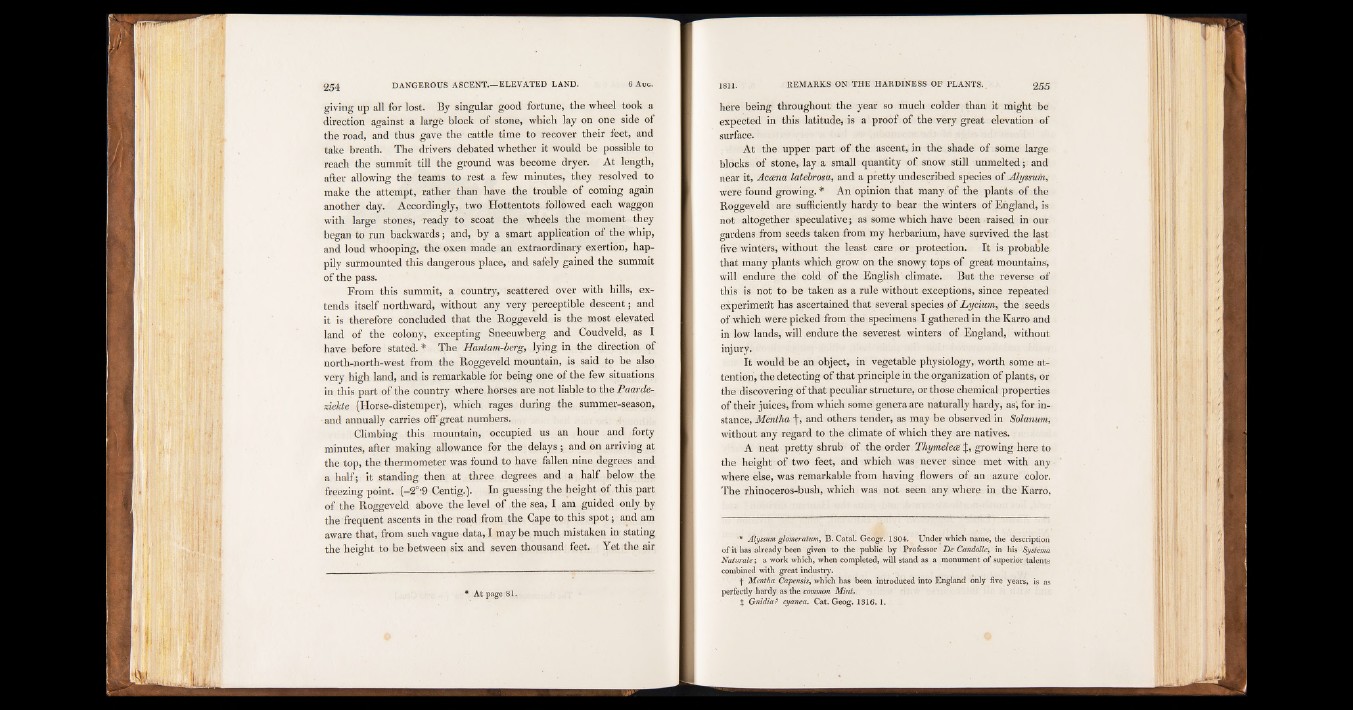
giving up all for lost. By singular good fortune, the wheel took a
direction against a large block of stone, which lay on one side of
the road, and thus gave the cattle time to recover their feet, and
take breath. The drivers debated whether it would be possible to
reach the summit till the ground was become dryer. At length,
after allowing the teams to rest a few minutes, they resolved to
make the attempt, rather than have the trouble of coming again
another day. Accordingly, two Hottentots followed each waggon
with large stones, ready to scoat the wheels the moment they
began to run backwards; and, by a smart application of the whip,
and loud whooping, the oxen made an extraordinary exertion, happily
surmounted this dangerous place, and safely gained the summit
of the pass.
From this summit, a country, scattered over with hills, extends
itself northward, without any very perceptible descent; and
it is therefore concluded that the Roggeveld is the most elevated
land of the colony, excepting Sneeuwberg and Coudveld, as I
have before stated. * The Hantam-berg, lying in the direction of
north-north-west from the Boggeveld mountain, is said to be also
very high land, and is remarkable for being one of the few situations
in this part of the country where horses are not liable to the Paarde-
ziekte (Horse-distemper), which rages during the summer-season,
and annually carries off great numbers.
Climbing this mountain, occupied us an hour and forty
minutes, after making allowance for the delays ; and on arriving at
the top, the thermometer was found to have fallen nine degrees and
a half; it standing then at three degrees and a half below the
freezing point. (-2°-9 Centig.). In guessing the height of this part
of the Roggeveld above the level of the sea, I am guided only by
the frequent ascents in the road from the Cape to this spot; and am
aware that, from such vague data, I maybe much mistaken in stating
the height to be between six and seven thousand feet. Yet the air
* At page 81.
here being throughout the year so much colder than it might be
expected in this latitude, is a proof of the very great elevation of
surface.
At the upper part of the ascent, in the shade of some large
blocks of stone, lay a small quantity of snow still unmelted ; and
near it, Accena latcbrosa, and a pretty undescribed species of Alyssum,
were found growing. * An opinion that many, of the plants of the
Roggevejd are sufficiently hardy to bear the winters of England, is
not altogether speculative; as some which have been raised in our
gardens from seeds taken from my herbarium, have survived the last
five winters, without the least care or protection. It is probable
that many plants which grow on the snowy tops of great mountains,
will endure the cold of the English climate. But the reverse of
this is not to be taken as a rule without exceptions, since repeated
experimeiit has ascertained that several species of Lycium, the seeds
of which were picked from the specimens I gathered in the Karro and
in low lands, will endure the severest winters of England, without
injury. ' ■
It would be an object, in vegetable physiology, worth some attention,
the detecting of that principle in the organization of plants, or
the discovering of that peculiar structure, or those chemical properties
of their juices, from which some genera are naturally hardy, as', for instance,
Mentha f , and others tender, as may be observed in Solanum,
without any regard to the climate of which they are natives.
A neat pretty shrub of the order Thymeleoe%, growing here to
the height of two feet, and which was never since met with any
where else, was remarkable from having flowers of an azure color.
The rhinoceros-bush, which was not seen any where in the Karro,
* Alyssum glomeratum, B. Catal. Geogr. 1304-. Under which name, the description
of it has already been given to the public by Professor De Candolle, in his Systema
Natarale ; a work which, when completed, will stand as a monument of superior talents
combined with great industry.
f Mentha Capensis, which has been introduced into England only five years, is as
perfectly hardy as the common Mint.
£ Gnidia? cyanea. Cat. Geog. 1316. 1.